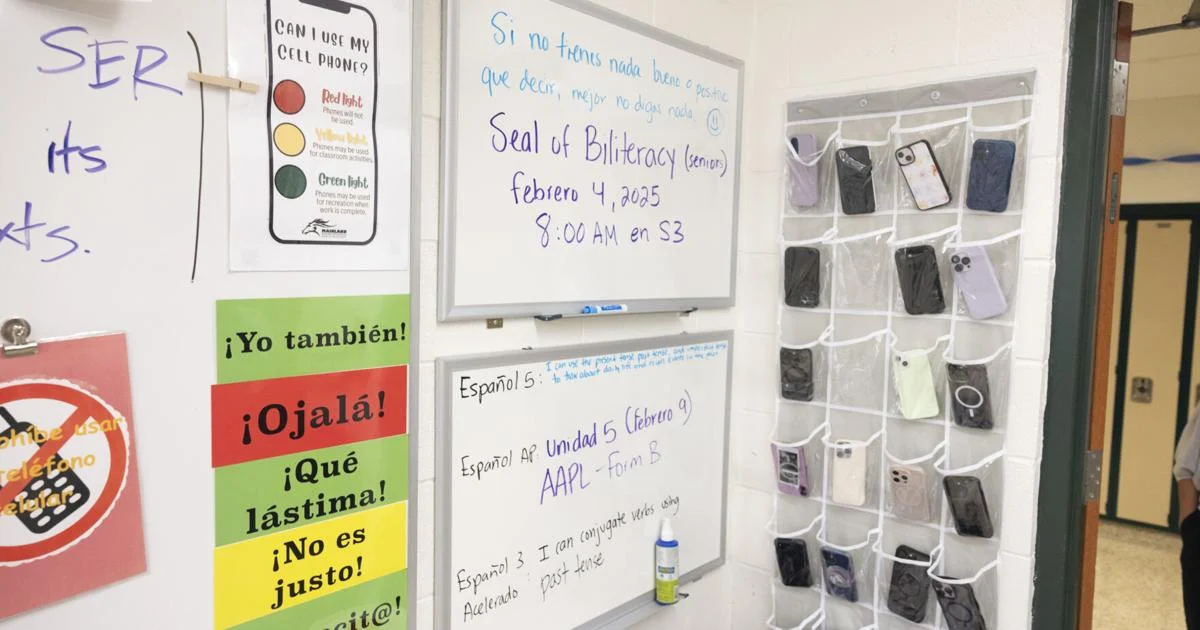
The two leading candidates in the race for governor both want to limit the distractions that cellphones create in school — but they have different plans to get there.
Rep. Mikie Sherrill (D) this week said she supports a bill that would implement a statewide ban on cellphones in classrooms, remarks she made as part of her campaign’s push to highlight the dangers of the digital world for children.
“I just think we should take cellphones out of classrooms. When you talk to educators, they are getting far more engagement from their classrooms without cellphones,” Sherrill said at an event at Kean University Monday.
Sherrill said if elected governor on Nov. 4, she would create a social media research center, similar to the New Jersey Gun Violence Research Center at Rutgers University, where researchers would look into age-appropriate screen times, what kind of content is helpful or harmful to kids, and more.
GOP candidate Jack Ciattarelli, a former state assemblyman, said he also wants to take cellphones out of students’ hands during class, but he opposes a state-mandated ban.
“Each district and the district’s parents should work together to work out what the specifics of that policy should be for their students,” he said in a statement to the New Jersey Monitor.
Both candidates are running to succeed Gov. Phil Murphy, a Democrat barred from running for a third term this year. Murphy backed a plan earlier this year to yank phones from students’ hands during classroom instruction, but the bill has yet to get a vote in the state Assembly (it passed the Senate unanimously).
The bill would require New Jersey’s education commissioner to develop guidelines that prohibit non-academic use of cellphones or social media during classroom instruction and would also require local school boards to develop policies consistent with the state guidelines.
Democrat Mikie Sherrill and Republican Jack Ciattarelli repeatedly clashed during their second and final debate in the closely watched race for New Jersey governor.
A third of public teachers say cellphone distraction in the classroom is a major problem, according to Pew Research. A Columbia University study shows that cellphones and social media can also harm kids’ mental health, disrupt sleep, and contribute to cyberbullying and isolation.
Last month, the state Department of Education released a report laying out three example policies that could be adopted: school districts could hold onto students’ devices during the school day; students could keep phones on them if they are turned off; or a version of the two to allow students to use their devices outside of academic time.
Sponsors of the bill said they’re hopeful these recommendations will push the bill forward. The Legislature does not return to Trenton for a voting session until after the election. Murphy’s term does not end until Jan. 20.
More than two dozen states have some regulation banning phones during the school day, and several New Jersey school districts have adopted their own rules barring phones.
Sherrill, when asked how she would sway lawmakers not convinced by Murphy’s push to ban phones in schools, said her proposed research center would provide data showing how harmful cellphones and social media can be, with the goal of educating more families on their impact.
“I’m not sure your average family gets how harmful some of this is and the bad outcomes we’re seeing, and so having the data alone is going to, I think, push the legislation to the forefront,” she said.
Ciattarelli took a shot at Sherrill’s approach for telling “parents what to do about their child’s cellphones in schools.”
“Students are best served when parents and school districts work together in partnership,” he said.
This story first appeared on the New Jersey Monitor.
Get Government & Politics updates in your inbox!
Stay up-to-date on the latest in local and national government and political topics with our newsletter.
* I understand and agree that registration on or use of this site constitutes agreement to its user agreement and privacy policy.